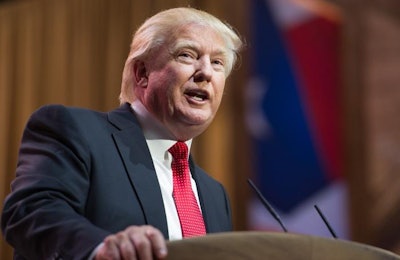
United States President Donald Trump on January 23 signed an executive order to withdraw from the Trans-Pacific Partnership (TPP) trade deal.
Just three days after his inauguration, the president, who vowed to withdraw from the trade agreement during his campaign, lived up to that promise, despite its widespread support from the agriculture industry.
The agreement, which had been reached by negotiators from the U.S., Japan, Canada, Australia, Brunei, Chile, Malaysia, Mexico, New Zealand, Singapore, Vietnam and Peru in 2015, still needed to be ratified by the governments of each participating country. Malaysia and Japan ratified the agreement, but the U.S. Congress did not act on it.
Agriculture groups respond
Several agricultural groups, including the American Feed Industry Association (AFIA) and the American Farm Bureau Federation (AFBF), quickly released statements disapproving of Trump’s executive order.
"TPP, and agreements like it, are key to setting the terms and rules for future trade relationships, creating higher standards and expectations than previous trade deals. While the U.S. economy generally deals with a trade deficit, agriculture is the one segment where our country enjoys a strong trade surplus," said AFIA President and CEO Joel G. Newman.
"TPP was intended to assist the U.S. in setting a global trade agenda, addressing international competition and combating continued market share losses in the region. Without TPP, the U.S. feed industry will lose more than the opportunities provided by tariff reductions. We will lose the opportunity to facilitate new trade relationships by addressing larger sanitary and phytosanitary issues, environmental protections, domestic job creation and regulatory cooperation.”
AFBF in 2016 released a report that showed that for every year TPP is not in place the U.S. would suffer a $94 billion hit. Its president, Vincent “Zippy” Duvall, reacted to the news by stating: “While President Trump signed an executive order today withdrawing our nation from the Trans- Pacific Partnership, we viewed TPP as a positive agreement for agriculture – one that would have added $4.4 billion annually to our struggling agriculture economy. With this decision, it is critical that the new administration begin work immediately to do all it can to develop new markets for U.S. agricultural goods and to protect and advance U.S. agricultural interests in the critical Asia-Pacific region.
“American agriculture is virtually always a winner when trade agreements remove barriers to U.S. crop and livestock exports because we impose very few compared to other nations. We have much to gain through strong trade agreements. AFBF pledges to work with the administration to help ensure that American agriculture can compete on a level playing field in markets around the world. But we need the administration’s commitment to ensuring we do not lose the ground gained -- whether in the Asia-Pacific, North America, Europe or other parts of the world."

















